Analysis
1. Alaska - Incumbent Republican Lisa Murkowski is facing a spirited challenge from Joe Miller, who is supported by the Palins. Murkowski's moderate voting record may be a tough sell in this political environment among Alaska Republicans, so the conservative Miller has a chance. Whoever wins the GOP primary is virtually certain to win the general election.
2. Arizona - John McCain, another Republican with a history of antagonizing his Republican base, is facing a conservative primary challenge from former GOP Congressman J.D. Hayworth. The conservative base is very fired up around the country this year, which would seem to spell disaster for McCain. Yet, if polls are any indication, McCain seems to be holding his own fairly well. One reason is that he seemed to see this wave coming and moved to the right. He has been one of the most outspoken critics of the Obama Administration's policies over the past year and has moved to the right (critics would call it flip-flopping and political opportunism) on immigration policy. Also, Hayworth is (IMO) a deeply flawed challenger with an abrasive campaign style, a history of gaffes, and some scandals in his past. My sense right now is that McCain will survive the primary, and if he does he is a sure bet to win re-election. If Hayworth pulls the upset, I think the Democrats have a real shot at this seat.
3. Arkansas - Democratic incumbent Blanche Lincoln is probably the most imperiled Senate incumbent running for re-election this year. Her poll numbers and job approval ratings are truly abysmal (32% in the latest Rasmussen poll!) Voters are very opposed to Obama and his agenda, and they are taking it out on Lincoln (who has attempted to please both the left and right and has succeeded in pleasing neither). I think it is highly unlikely that she can win against GOP Congressman John Boozman, but I am leaving this in the "Leans Republican" category for now because I don't want to rank a race with an incumbent as safe for the other party this far before the election.
4. California - Liberal Democratic Senator Barbara Boxer generally has no trouble getting re-elected in this heavily Democratic state. But this year she appears unusually vulnerable. Her unfavorability ratings are very high and her polling numbers are very weak -- consistently under 50% and only a few points ahead of her challenger, Carly Fiorina. Fiorina is the strongest challenger the GOP could hope for. She is conservative enough to satisfy a very active and angry Republican base, but her business background and common-sense demeanor may help her appeal to moderates and independents. Also, she may mitigate Boxer's traditional advantage among female voters, and she certainly has very deep pockets which will keep her at least stay competitive with Boxer when it comes to raising and spending money in the most expensive campaign state in the country. In this liberal state, a long-time Democratic incumbent will always start out with the advantage, but I think the GOP has a real chance here.
5. Colorado - This race is a little difficult to predict right now, because both the Democratic and Republican primaries remain undecided. On the GOP side, the conservative favorite Ken Buck is surging and appears to be well-positioned to upset GOP establishment choice Jane Norton. On the Democratic side, it's a race between appointed Democratic incumbent Michael Bennet (endorsed by Obama) and former speaker of the CO House Andrew Romanoff (endorsed by Bill Clinton). Polling has generally shown a narrow advantage for the Republican over the Democrat, regardless of who the nominees are. Obama and his health care bill are quite unpopular in this swing state, and for that reason alone I think the GOP is likely to pull this out in the end, although I expect a close race.
6. Connecticut - Originally, this race was thought to be an excellent pickup opportunity for Republicans, with ethically-challenged Democratic incumbent Chris Dodd polling very poorly. Then Dodd decided to retire, and the state's extremely popular Attorney General, Richard Blumenthal, jumped in the race. Conventional wisdom said Blumenthal was certain to win easily and keep the seat in Democratic hands. So far, Blumenthal has run a weak, gaffe-prone campaign that has given the GOP hope again. Yet, IMO, the GOP is poorly positioned to take advantage of it since they are on the verge of nominating the founder of WWF, Linda McMahon, as their chosen candidate. Yes, McMahon is willing to pour an almost unlimited amount of her personal wealth into the race, but she has no political experience and her close association with WWF is controversial at best. Polls are showing Blumenthal with a large, although slightly decreasing, lead. Anything is possible in an open seat in this political climate, but Obama is still somewhat popular in this liberal-leaning state and I think this is a long-shot for the GOP.
7. Delaware - This Senate seat became vacant when Joe Biden became Vice-President, and was filled by an appointed Democratic replacement who is not running this year. The likely general election matchup is between the state's long-time GOP congressman, Michael Castle, and local Democratic official Chris Coons. (Vice-President Biden's son, Beau Biden, was originally expected to run for this seat, but later changed his mind and declined to run.) Castle compiled a very moderate voting record while in Congress (he is currently the most liberal GOP member of the House), and is extremely popular in this Democratic state. Although Democrats believe Coons is a strong candidate, early polls have indicating that he is badly trailing in this race. I think this is the GOP's to lose.
8. Florida - This race has gotten a lot of attention, with GOP Governor Charlie Crist dropping out of a Republican primary he was certain to lose and announcing he will run for the Senate as an independent. This sets up a three-way race between Republican Marco Rubio, Democrat Kendrick Meek, and Independent Charlie Crist. (BTW, a late entry to the Democratic primary, millionaire Jeff Greene, is making some waves and might have a chance at upsetting Meek.) Crist has moved sharply to the left on a number of issues since leaving the Republican party, and he has been leading in several recent polls due to widespread Democratic support, with Democrat Meek trailing badly. In the end, I question whether Crist will be able to sustain his momentum, given the state's relatively small percentage of unaffiliated voters (less than 20%), possible problems raising money for Crist, and his blatantly opportunistic party switch. His only chance is if the Democratic party decides he is their only hope to defeat Marco Rubio and decides to support him and abandon the Democratic nominee. But Rubio is a very articulate candidate who has been very successful at raising money and who has a message that should be very appealing to the electorate in this political climate. This race is tight and unpredictable, but my gut feeling is that Rubio will win a three-way race.
9. Georgia - A few political observers seem to think GOP incumbent Johnny Isakson is potentially vulnerable, which really surprises me. There is no way this reasonably popular Republican incumbent is going to lose in a Republican-leaning state in a Republican-leaning year.
10. Illionis - You'd think that if there were any seat that should be safe for the Democrats, it would Barack Obama's old Senate seat in Democratic-leaning Illinois. Not so. Obama's interim replacement is not running for re-election, and Republican Mark Kirk is looking surprisingly strong against Democrat Alexi Giannoulias in this open seat race. Kirk is a moderate-to-liberal Republican who represented a Democratic-leaning suburban Chicago district for a number of years and who seems to have substantial appeal to independents and moderate Democrats. He has also been very effective at raising money thus far. Illinois voters are already fed up with the scandals of the Democratic party in the state (remember Rod Blagojevich?) and Giannoulias has plenty of baggage himself. Besides ties to the ethically-challenged Democratic machine in Chicago, Giannoulias's family-owned bank went bankrupt this year. Working in Giannoulias's favor are the state's Democratic tilt and the fact that Obama will likely pull out all the stops to hold this seat. There has been a bit of a scandal over Kirk's supposed exaggeration of his military record, but it doesn't seem very significant to me and it doesn't seem to have hurt Kirk much in the polls. I give him a slight edge in what I expect to be a very close race.
11. Indiana - This is not a good year to run as a Democrat in Indiana. The state, which has trended toward Democrats the last couple of election cycles, is now swinging sharply back toward the GOP. Both Obama's disapproval rating and opposition to ObamaCare are currently at 60% or higher, and Democrat Brad Ellsworth is paying the price for voting in favor of the health care bill. Recent polls have shown Ellsworth trailing Republican nominee and former senator Dan Coats by double-digits. Coats has some baggage (he has been living outside of the state and doing lobbying work in Washington, DC for the past 10 years) and is doubtless a little rusty on the campaign trail (his last campaign was 1992). In a year less favorable to the GOP, the moderate Ellsworth would be even money or better to win. In 2010, Coats has a definite advantage.
12. Iowa - Some political pundits believe Republican Senator Chuck Grassley is vulnerable. True, Iowa did go heavily for Obama in 2008, and Grassley's likely Democratic opponent Roxanne Conlin has raised plenty of cash. And Grassley's early attempts to work out a compromise on the health care legislation did not endear him to the conservative wing of his party. But Grassley has proved himself to be very effective at winning elections in a state which often trends Democratic, and since he was first elected in the early 1980's he has built up enough popularity and goodwill to consistently roll up sizable victory margins in both favorable and unfavorable political climates. It's not inconceivable that even a fixture like Grassley could lose a future election in such a polarized political environment, but it won't be in a year as favorable to the GOP as 2010 is likely to be.
13. Kansas - The real battle for this Senate seat is in the GOP primary, where two Republican congressmen, Jerry Moran and Todd Tiahrt, are squaring off against each other. Moran is the frontrunner but Tiahrt is especially popular among social conservatives in the state and has been endorsed by Sarah Palin. Either candidate is expected to win pretty easily in this Republican state over relatively token Democratic opposition.
14. Kentucky - This is another Senate race that has gotten a lot of attention lately. Eye doctor Rand Paul, a political neophyte with libertarian, non-traditional Republican views and a close association with the Tea Party movement, crushed the establishment GOP candidate in the primary. He then came right out the gate with a huge gaffe in an MSNBC interview in which he seemed to be expressing skepticism about the Civil Rights Act (he later clarified his remarks by strongly affirming his support for that landmark bill). Paul's biggest advantage is that he is running in a state where Obama and his agenda are especially unpopular, and he is facing a Democratic opponent, Jack Conway, who is quite liberal and an unabashed supporter of the Democratic health care bill. The enthusiasm of Paul's supporters will also help him with turnout -- if there were ever a year in which Paul's anti-government views were in vogue, it would be in 2010! Right now, Paul seems to have the advantage, but Conway is reputed to be a strong campaigner and if Paul makes more gaffes then the Democrats could have an opening here.
15. Louisiana - The Republicans are in much better shape in this race than anyone would have imagined a year or two ago. When news came out a couple of years ago that conservative Senator David Vitter was involved with a prostitute, most people assumed his career was over. Sex scandals are usually the kiss of death for politicians, especially conservative ones. But Vitter was apparently able to mitigate the damage somewhat by confessing to his wife before the news became public and by working to repair his marriage, and he now seems to be in relatively good shape to be re-elected. Vitter's Democratic opponent, Charlie Melancon, is a moderate who voted against the health care bill in the House. I thought that the Gulf oil spill might work to Melancon's advantage, as he has taken a very public role in advocating for Louisiana and taking BP to task. However, he doesn't seem to be getting much traction and is running well behind in polls so far. Obama's deep unpopularity in this Deep South state doesn't help. There would have to be a major change in momentum for Vitter to lose this race.
16. Missouri - This open seat race to replace retiring Republican Kit Bond is pretty well-defined, as GOP Congressman Roy Blunt and Democratic Secretary of State Robin Carnahan have been the presumptive nominees of their respective parties for months. Missouri has a recent history of highly competitive Senate races, and this one seems to be no exception. Both candidates come from well-known political families and have raised plenty of cash. However, recent polls have shown Blunt with a slight advantage, and it seems likely that Obama's unpopularity here will hurt Carnahan. Even in 2008, a year with record black turnout, Obama was unable to carry the state; 2010 will be much more favorable to the GOP. My money is on Blunt.
17. Nevada - Senate Majority Leader Harry Reid, the most powerful Democrat in the Senate, is in the fight of his political life. For months, polls have been showing Reid hovering at 40% of the vote or below and badly trailing several lesser-known GOP challengers -- not a good place for a 24-year incumbent to be. Reid's partisan tactics (especially in regard to the health care bill) and numerous recent controversial comments have contributed to his unpopularity in this swing state. Another factor working against Reid is Obama's unpopularity in the state, fueled by the state's double-digit unemployment and highest-in-the-nation home foreclosure rate. However, there is a big silver lining for Reid. He is facing a weak challenger, Sharron Angle. I happen to like Angle and agree with her conservative positions, but she has little political experience and a history of making controversial statements and Reid is already trying to use those statements against her to paint her as an extremist. Reid is an extremely tough campaigner who won't go down without a vicious fight. It remains to be seen whether Angle will be well-funded, articulate, and tough enough to go toe-to-toe with Reid on the airwaves and in debates. Plus, several third-party candidates are on the ballot in addition to Nevada "none-of-the-above" ballot option. Reid could easily win this race with 45% of the vote or less. I badly want to see Reid defeated and I know he is very vulnerable, but I want to see how Angle holds up over the next couple of months before I am ready to predict her as the winner of this race.
18. New Hampshire - This New England state, once solidly Republican, has been trending Democratic over the past decade, so when Republican Senator Judd Gregg decided to retire, Democrats saw a prime pickup opportunity. However, Obama's political fortunes have dramatically declined here since he dominated the state in Election 2008, and Republicans now look well-positioned to hold this seat and also possibly pick up both the state's House seats as well. Likely Democratic nominee Paul Hodes is taking heat for supporting the health care bill and is currently trailing the two perceived GOP frontrunners, former attorney general Kelly Ayotte and businessman Bill Binnie. But it's hard to predict with any accuracy until after the Republicans have a definite nominee.
19. New York Special - This election is to fill the remainder of Hillary Clinton's Senate term. The incumbent is Democrat Kirsten Gillibrand, who was appointed to the seat by the state's governor last year. Since Gillibrand has never before been elected, her name recognition is much weaker than a typical incumbent, and her re-elect polling numbers have been consistently under 50%, indicating vulnerability. Unfortunately, the Republican party has been unable to find a top-tier candidate to run against her. The current crop of challengers is weak and underfunded, so this looks safe for the Democrats.
20. North Carolina - Democrats see this race as probably their best opportunity to pick off a GOP incumbent in 2010. Republican Richard Burr is running for re-election for the first time, and his approval numbers have been unimpressive, largely due to the low profile he has kept during his first term (a large number of voters have no opinion of him, unusual for an incumbent). Fortunately for Burr, the Democratic nominee Elaine Marshall, while a viable state-wide candidate, is not particularly exciting either and was not the first choice of the Democratic establishment. Some polls have shown Burr comfortably ahead, while others have shown him running neck-and-neck with Marshall. Although North Carolina did narrowly support Obama in 2008, it remains a fairly conservative state. It's hard for me to see an incumbent Republican losing here in a Republican year, apart from a major scandal or misstep.
21. North Dakota - When long-time Democratic Senator Byron Dorgan decided to retire, Democrats knew they were in trouble. And when the state's popular Republican governor John Hoeven officially announced his candidacy, Democrats essentially conceded the race. A recent poll showed Hoeven clinging to 45 point lead over some Democratic sacrificial lamb.
22. Ohio - In my opinion, this seat will be the hardest seat for the GOP to hold on to this election cycle. Obama is not very popular here, a state that has been hit hard by the economic downturn, and the unopposed Republican nominee Rob Portman looked strong in early polling. But Lieutenant Governor Lee Fisher has succeeded in erasing his polling deficit against Portman. The GOP still has a big financial advantage and the national political winds blowing in their favor, but numerous scandals have badly damaged the Republican brand in this state and Portman's ties to the Bush administration may not work in his favor. I still think the GOP is more likely than not to hold this seat, but I expect a close race.
23. Pennsylvania - This is another big tossup open seat race. Liberal Democrat Joe Sestak defeated incumbent Arlen Specter in the primary and now faces conservative Republican Pat Toomey in the general election. The Democratic lean of the state works to Sestak's advantage, but Obama's current unpopularity among Pennsylvania voters works to Toomey's advantage. Also, Toomey has more money and has been able to take advantage of a rift between Sestak and his party (over an alleged bribe made to Sestak by the Obama Administration) in order to jump out to a small lead in the polls. This race is close and could go either way, but I'd rather be in Toomey's position right now.
24. Washington - After months of hedging and stalling, the GOP's favored candidate, Dino Rossi, finally jumped into the race and will take on three-term Democratic incumbent Patty Murray. Murray's re-elect numbers are weak, and Rossi has excellent name recognition and is the best candidate Republicans could hope for in this Democratic state. Given the toxic environment for incumbents this year, it is not really surprising that polls are indicating a very close race. Still, Murray has little trouble getting elected in the past, and Washington has not elected a Republican to statewide office in well over a decade. (OK, a lot of us believe that Dino Rossi won the 2002 governor's race and it was stolen from him in the "recount.") Also, Obama is a lot more popular here than in the country at large. I'm still a bit skeptical that the Republicans can win this race.
25. Wisconsin - Russ Feingold is another Democratic incumbent who looks quite vulnerable. Feingold is a very liberal Democrat representing a swing state, and while Feingold has been elected to the Senate three times, he has never won more than 56% of the vote (even against a very weak challenger in 2004). While the Republicans didn't get the challenger they wanted this year (former Governor Tommy Thompson), I actually think Ron Johnson, the likely Republican nominee, may prove to be a stronger candidate than Thompson would have been. One advantage for Feingold is Wisconsin's very late primary (in mid-September), which means it will be a long time before Johnson can clinch the Republican nomination. Feingold also has the advantages of name recognition and a huge campaign warchest. Polls are showing the race to be a virtual tossup. For now, I give Feingold a slight advantage, but if I were the Democrats I would be worried about this seat.
To summarize: Right now I'm predicting a 7 seat pickup for the Republicans. A 10 seat gain, which would give them the Senate majority, is not out of the realm of possibility, but it would require a huge anti-Democratic wave. In my opinion, there are only 11 Democratic seats that are reasonably vulnerable to GOP takeover, so to take the Senate the Republicans would have to win 10 out of 11. Plus, they would have to hold all 6 of their own reasonably vulnerable open seats. In other words, they would have to run the table. Not easy to do even in a great year.
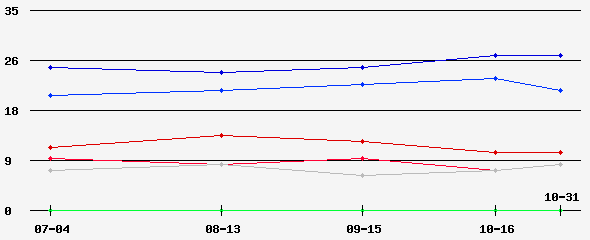





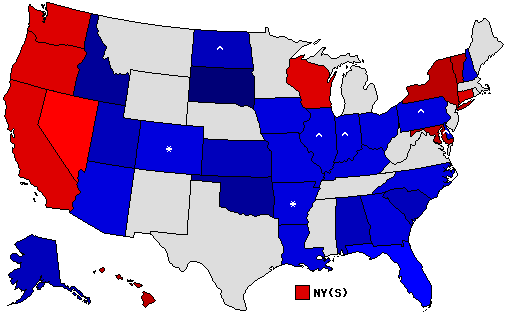
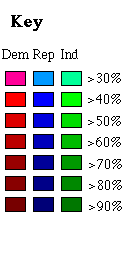
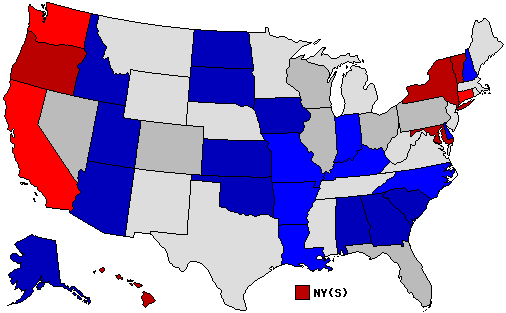
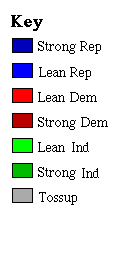
 2012 President
2012 President 2012 Senate
2012 Senate 2012 Governor
2012 Governor 2010 Senate
2010 Senate 2010 Governor
2010 Governor

